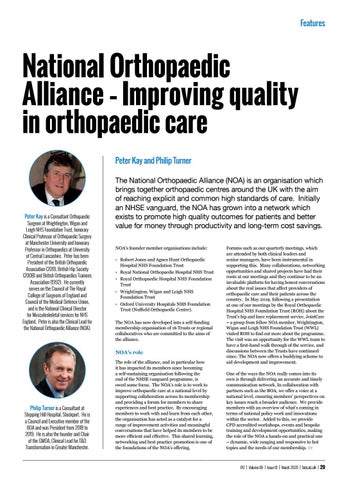Features
National Orthopaedic Alliance – Improving quality in orthopaedic care Peter Kay and Philip Turner
Peter Kay is a Consultant Orthopaedic Surgeon at Wrightington, Wigan and Leigh NHS Foundation Trust, honorary Clinical Professor of Orthopaedic Surgery at Manchester University and honorary Professor in Orthopaedics at University of Central Lancashire. Peter has been President of the British Orthopaedic Association (2011), British Hip Society (2008) and British Orthopaedics Trainees Association (1992). He currently serves on the Council of The Royal College of Surgeons of England and Council of the Medical Defence Union, and is the National Clinical Director for Musculoskeletal services for NHS England. Peter is also the Clinical Lead for the National Orthopaedic Alliance (NOA).
The National Orthopaedic Alliance (NOA) is an organisation which brings together orthopaedic centres around the UK with the aim of reaching explicit and common high standards of care. Initially an NHSE vanguard, the NOA has grown into a network which exists to promote high quality outcomes for patients and better value for money through productivity and long-term cost savings. NOA’s founder member organisations include: • Robert Jones and Agnes Hunt Orthopaedic Hospital NHS Foundation Trust • Royal National Orthopaedic Hospital NHS Trust • Royal Orthopaedic Hospital NHS Foundation Trust • Wrightington, Wigan and Leigh NHS Foundation Trust • Oxford University Hospitals NHS Foundation Trust (Nuffield Orthopaedic Centre). The NOA has now developed into a self-funding membership organisation of 16 Trusts or regional collaboratives who are committed to the aims of the alliance.
NOA’s role
Philip Turner is a Consultant at Stepping Hill Hospital, Stockport. He is a Council and Executive member of the BOA and was President from 2018 to 2019. He is also the founder and Chair of the GMOA, Clinical Lead for T&O Transformation in Greater Manchester.
The role of the alliance, and in particular how it has impacted its members since becoming a self-sustaining organisation following the end of the NHSE vanguard programme, is owed some focus. The NOA’s role is to work to improve orthopaedic care at a national level by supporting collaboration across its membership and providing a forum for members to share experiences and best practice. By encouraging members to work with and learn from each other, the organisation has acted as a catalyst for a range of improvement activities and meaningful conversations that have helped its members to be more efficient and effective. This shared learning, networking and best practice promotion is one of the foundations of the NOA’s offering.
Forums such as our quarterly meetings, which are attended by both clinical leaders and senior managers, have been instrumental in supporting this. Many collaborations, networking opportunities and shared projects have had their roots at our meetings and they continue to be an invaluable platform for having honest conversations about the real issues that affect providers of orthopaedic care and their patients across the country. In May 2019, following a presentation at one of our meetings by the Royal Orthopaedic Hospital NHS Foundation Trust (ROH) about the Trust’s hip and knee replacement service, JointCare – a group from fellow NOA member, Wrightington, Wigan and Leigh NHS Foundation Trust (WWL) visited ROH to find out more about the programme. The visit was an opportunity for the WWL team to have a first-hand walk through of the service, and discussions between the Trusts have continued since. The NOA now offers a buddying scheme to aid development and improvement. One of the ways the NOA really comes into its own is through delivering an accurate and timely communication network. In collaboration with partners such as the BOA, we offer a voice at a national level, ensuring members’ perspectives on key issues reach a broader audience. We provide members with an overview of what’s coming in terms of national policy work and innovations within the sector. Added to this, we provide CPD accredited workshops, events and bespoke training and development opportunities, making the role of the NOA a hands-on and practical one – dynamic, wide ranging and responsive to hot topics and the needs of our membership. >>
JTO | Volume 08 | Issue 01 | March 2020 | boa.ac.uk | 29
